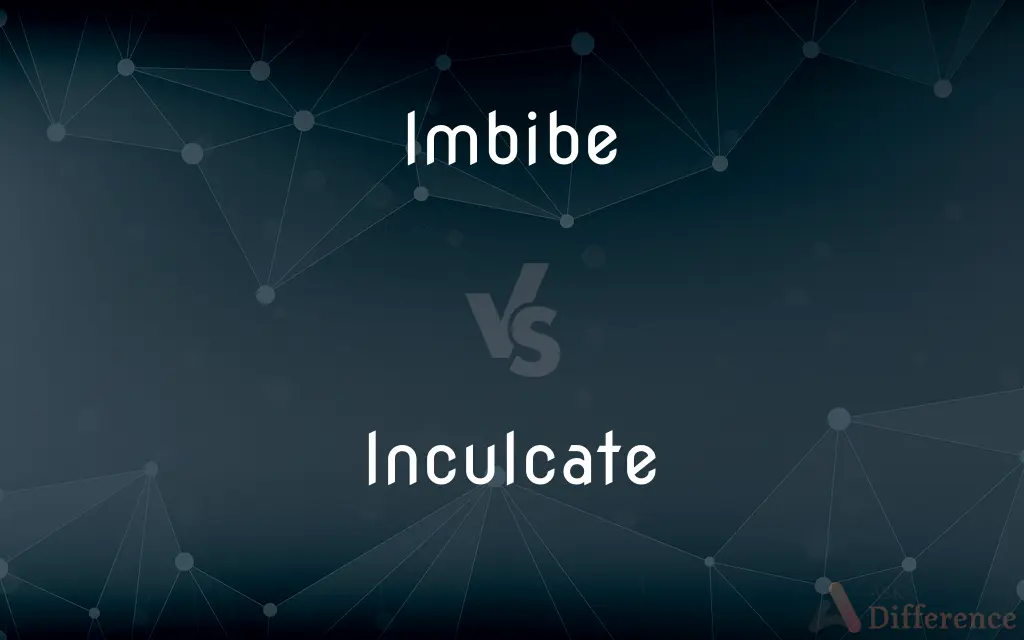Imbibe vs. Inculcate — What's the Difference?
By Urooj Arif & Fiza Rafique — Updated on April 9, 2024
Imbibe typically means to drink, especially alcohol, or absorb ideas, whereas inculcate refers to instilling ideas, values, or behaviors through persistent instruction.

Difference Between Imbibe and Inculcate
Table of Contents
ADVERTISEMENT
Key Differences
Imbibe originally pertains to drinking liquids, particularly alcohol, suggesting a physical intake or consumption. In contrast, inculcate is used in the context of teaching or instilling values, attitudes, or skills, emphasizing a deliberate and often repetitive process.
While imbibe can also metaphorically mean to absorb or take in information, ideas, or culture, often passively or through general exposure, inculcate specifically implies an active, methodical approach to teaching or impressing ideas upon someone, usually requiring effort and intentionality on the part of the instructor or influencer.
Imbibing is a process that can be voluntary, such as choosing to drink a beverage or engage with cultural practices, or involuntary, as when one is influenced by their surroundings without making a conscious effort to learn. On the other hand, inculcating assumes an active role by one party to instill certain principles or habits in another, often within educational or parental contexts.
The contexts in which imbibe and inculcate are used also differ significantly. Imbibe is more commonly used in casual or social settings when referring to drinking, or in intellectual contexts to describe absorbing information. Inculcate, however, is more formal and is often found in academic, professional, or moral discussions where there is a clear goal to impart specific knowledge or ethics.
Both terms share the concept of receiving or taking in, but the nature of what is received and the manner of its reception diverge greatly. Imbibe often deals with tangible or intellectual intake, while inculcate deals with the deliberate planting of more abstract concepts such as beliefs or behaviors in someone's mind.
ADVERTISEMENT
Comparison Chart
Primary Meaning
To drink; absorb ideas or information
To teach and impress by frequent repetitions
Usage Context
Social, cultural, intellectual
Educational, moral, professional
Process
Voluntary/involuntary; passive
Active; requires effort and intention
Nature of Input
Liquids, culture, information
Ideas, values, principles, habits
Intended Outcome
Enjoyment, knowledge acquisition
Behavioral change, knowledge instillation
Compare with Definitions
Imbibe
To receive into the mind and retain.
She imbibed the beauty of the poetry.
Inculcate
To infuse an idea or habit into someone's mind so deeply.
He inculcated in them the importance of punctuality.
Imbibe
To absorb or be imbued with as if by drinking.
The player imbibed confidence from his coach.
Inculcate
To cause to accept something, such as an idea or principle.
The program is designed to inculcate a love for reading.
Imbibe
To drink liquids, especially alcoholic beverages.
They imbibed fine wines at the dinner.
Inculcate
To instill an attitude, idea, or habit by persistent instruction.
The mentor inculcated in her protégés the need for ethical integrity.
Imbibe
To take in or up, as through pores or interstices.
The fabric imbibes the dye quickly.
Inculcate
To teach and impress by frequent repetition or instruction.
Parents inculcate values in their children.
Imbibe
To absorb or take in information or ideas.
He imbibed the essence of the lecture.
Inculcate
To implant by repeated statement or admonition.
The teacher inculcated a sense of responsibility in her students.
Imbibe
Imbibe is a magazine published in Portland, Oregon, United States. It is published six times a year.
Inculcate
To impress (something) upon the mind of another by frequent instruction or repetition; instill
Inculcating sound principles.
Imbibe
Drink (alcohol)
They were imbibing far too many pitchers of beer
Inculcate
To teach (others) by frequent instruction or repetition; indoctrinate
Inculcate the young with a sense of duty.
Imbibe
To drink.
Inculcate
(transitive) To teach by repeated instruction.
Imbibe
To absorb or take in as if by drinking
"The whole body ... imbibes delight through every pore" (Henry David Thoreau).
Inculcate
(transitive) To induce understanding or a particular sentiment in a person or persons.
Imbibe
To receive and absorb into the mind
"Gladstone had ... imbibed a strong prejudice against Americans" (Philip Magnus).
Inculcate
To teach and impress by frequent repetitions or admonitions; to urge on the mind; as, Christ inculcates on his followers humility.
The most obvious and necessary duties of life they have not yet had authority enough to enforce and inculcate upon men's minds.
Imbibe
(Obsolete) To permeate; saturate.
Inculcate
Teach and impress by frequent repetitions or admonitions;
Inculcate values into the young generation
Imbibe
To drink alcoholic beverages.
Imbibe
To drink (used frequently of alcoholic beverages).
Imbibe
(figuratively) To take in; absorb.
To imbibe knowledge
Imbibe
To steep; to cause to absorb liquid.
Imbibe
To drink in; to absorb; to soak up; to suck or take in; to receive as by drinking; as, a person imbibes drink, or a sponge imbibes moisture.
Imbibe
To receive or absorb into the mind and retain; as, to imbibe principles; to imbibe errors.
Imbibe
To saturate; to imbue.
Imbibe
Take in, also metaphorically;
The sponge absorbs water well
She drew strength from the minister's words
Imbibe
Take (gas, light or heat) into a solution
Imbibe
Take in liquids;
The patient must drink several liters each day
The children like to drink soda
Imbibe
Receive into the mind and retain;
Imbibe ethical principles
Common Curiosities
Is inculcation always formal?
While inculcation often occurs in formal settings like schools, it can also happen informally through consistent messaging or example in homes or communities.
Does inculcate imply brainwashing?
Not necessarily. While inculcate involves persistent instruction, it's generally seen as a positive or neutral term focused on education, unlike brainwashing, which implies coercion.
Can technology inculcate ideas?
Yes, technology, through media and repetitive content exposure, can play a role in inculcating ideas or attitudes.
How long does it take to inculcate a habit?
The time varies; inculcating a habit requires persistent effort and repetition over weeks or even months, depending on the complexity of the habit.
Can someone imbibe bad habits?
Yes, one can imbibe bad habits by picking them up through observation or influence, often without deliberate intent.
What does it mean to imbibe?
To imbibe means to drink fluids or to absorb ideas or information, either physically or metaphorically.
What are common methods to inculcate values?
Common methods include repeated discussions, role modeling, practical exercises, and positive reinforcement.
How is inculcate different from teaching?
Inculcate involves teaching through frequent repetition and emphasis, aiming to instill values or principles deeply, beyond basic knowledge transfer.
Can you imbibe values?
Metaphorically, yes. Imbibing values means absorbing or adopting them, often through exposure rather than formal teaching.
How does culture influence what we imbibe?
Culture significantly influences the ideas, practices, and values we imbibe, as it shapes the environment and contexts we are exposed to.
Is imbibing knowledge the same as learning?
Imbibing knowledge can be part of learning, involving the absorption of information, though learning typically encompasses understanding and applying that knowledge.
Why is inculcation important in education?
Inculcation helps ensure that students not only learn but internalize important concepts, values, and habits, making them a part of their daily lives.
Share Your Discovery

Previous Comparison
Aerogel vs. Xerogel
Next Comparison
Briar vs. FriarAuthor Spotlight
Written by
Urooj ArifUrooj is a skilled content writer at Ask Difference, known for her exceptional ability to simplify complex topics into engaging and informative content. With a passion for research and a flair for clear, concise writing, she consistently delivers articles that resonate with our diverse audience.
Co-written by
Fiza RafiqueFiza Rafique is a skilled content writer at AskDifference.com, where she meticulously refines and enhances written pieces. Drawing from her vast editorial expertise, Fiza ensures clarity, accuracy, and precision in every article. Passionate about language, she continually seeks to elevate the quality of content for readers worldwide.














































